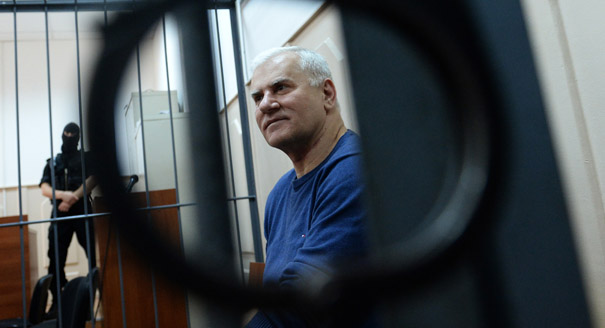The man who was regarded as the second most powerful figure in the Russian North Caucasus has suffered a spectacular fall from grace.
Said Amirov, the former mayor of Makhachkala, had dominated political life in Dagestan for years, On August 27, he was given a life sentence in prison by a court in Rostov-on-Don. Several of Amirov's closest associates, including his nephew Yusuf Dzhaparov, also received lengthy sentences.
Amongst other crimes, the men were found guilty of the 2011 assassination of senior counter-intelligence official Arsen Gadzhibekov and of organizing a bombing at a shopping center in the town of Kaspiisk.
For a long time, Amirov's political stature in the North Caucasus was second only to Chechen leader Ramzan Kadyrov—although unlike Kadyrov, he had no political ambitions outside Dagestan, the largest republic in the region.
In 2006, Amirov ran in Dagestan’s presidential election, but lost to Mukhu Aliyev. Despite this, he retained enormous influence in his home region. His clout in Makhachkala has been compared to Yuri Luzhkov’s reign in Moscow. The city became his personal domain, with all administrative positions of any significance doled out to relatives and protégés. His personal fortune was rumored to be worth billions of dollars. Over time, Amirov believed he was in charge of the whole of Dagestan.
Amirov had many enemies. The most serious of many assassination attempts on him in 1993 left him confined to a wheelchair. The attacks were always presented as terrorist attacks by Islamic militants, but local observers attributed them to domestic rivalries.
Gradually, Amirov began losing touch with reality and imagining that he had the same kind of carte blanche as Ramzan Kadyrov did in Chechnya. However, Dagestan is very different from Chechnya. To operate there you need to manage clan rivalries and not upset the delicate balance between its many different ethnic groups. Amirov was not the president of the republic and, unlike Kadyrov, he did not have a direct line to Russian President Vladimir Putin.
In 2013, Ramazan Abdulatipov was appointed as head of Dagestan and naturally saw Amirov as a threat to the goal Putin had set him of “bringing order” to the region. But Amirov did not capitulate. He dared to clash with Russia’s law enforcement authorities (siloviki). Arsen Gadzhibekov, the top investigating official, began compiling evidence against Amirov’s clan with support from Moscow. When he was murdered, the Kremlin saw it as a direct challenge.
In June 2013, Amirov was arrested in a full military operation that included the use of helicopters. Moscow feared that his seizure would destabilize the situation not just in Makhachkala, but in the whole of Dagestan. However, the operation was executed so swiftly that Amirov's supporters were unable (and very likely afraid) to respond in time.
Taken to Moscow, Amirov first tried to strike a deal with the authorities. When he failed to do so, he tried to commit suicide. The doctors saved his life, and he had to stand trial.
Amirov’s fall from grace is proof that no one is untouchable in Russia today. The Kremlin did not seek compromise, when it had the opportunity to do so.
Some see the case as being a warning to Ramzan Kadyrov the leader of neighboring Chechnya and the man who calls himself “Putin’s foot-soldier” because he is answerable only to the Russian president himself.
Kadyrov is in a category of his own, however. Unlike Amirov, it seems that Putin sees the Chechen leader as irreplaceable and fears that his departure would destabilize his home republic. It is simply impossible to imagine a military operation to arrest Kadyrov. Moreover, the Chechen leader constantly emphasizes not only his loyalty to Putin, but also his readiness to help him out in tough situations, such as in Ukraine.
In fact, the downfall of the Dagestani leader may work to Kadyrov's advantage, as the two men were political adversaries. Kadyrov once publicly referred to one of Amirov’s main enemies, Sagid Murtazaliyev—the head of Dagestan's Pension Fund and a man who was recently accused of financing terrorist attacks and fled Russia—as his “brother.”
Amirov’s story is intended as a reminder to regional oligarchs in the North Caucasus that they are fully accountable to the federal center. Amirov certainly had patrons in Moscow, but he overestimated their influence. From now on, each republic of the North Caucasus can have only one boss, approved by the center.
In Dagestan itself, the wealth and power he amassed have already been redistributed and Amirov’s clan has lost a lot—although not everything. We should not forget that Amirov is an ethnic Dargin and it would be unwise—indeed impossible—to insult the second biggest ethnic group in the republic.
So Amirov's downfall will not have a big impact on Dagestan or the North Caucasus. Rather, the local elites have been given a sharp reminder that they must play by the rules and should not mess with the siloviki—with Kadyrov remaining an exception.
Dagestan's chronic instability has eased a little over the past three years. Localized fights cannot undermine this situation of relative calm. But, as ever, this could all be upset by an overall downturn in the Russian economy, cuts in budget subsidies from the center, and of course the impact of radical Islam.







